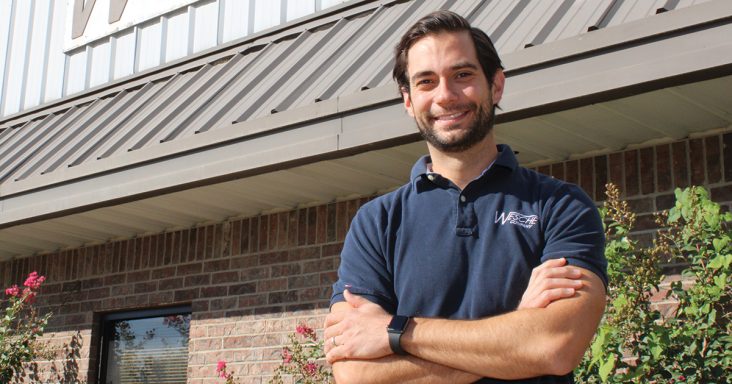Small businesses working to expand DEI strategies
by October 17, 2021 11:07 am 1,915 views

Jacob McConnell, president of Wesche Co. in Springdale, built a DEI plan for his business through the IDEALS Institute at the University of Arkansas, which specializes in training, consulting and research surrounding DEI topics.
Diversity, equity and inclusion (DEI) efforts are typically spearheaded from a position or office solely dedicated to such measures for large organizations.
Small businesses, which employ approximately half of the nation’s workforce, rarely get that luxury, as they may lack the resources of larger companies to devote to such efforts.
DEI efforts are expanding and growing in Northwest Arkansas, and small businesses recognize the importance of integrating that work into their organizations. Regional partners are also providing resources to help.
ASSESSING THE NEED
In 2019, the Northwest Arkansas Council administered a workplace diversity and inclusion survey to businesses and companies across the region in partnership with the Sam M. Walton College of Business at the University of Arkansas. The survey gauged diversity and inclusion efforts in the area and identified strengths and challenges for the region related to diversity, equity and inclusion. Seventy-seven percent of respondents were small employers, defined as companies employing less than 50 people.
The survey found that while the demographics of Northwest Arkansas’ workforce mirrored the regional demographics — the workforce of responding organizations was 79% white and 51% male, compared to the region’s demographics of 73% white and 50% male — top-level leadership and board of directors were disproportionally white and male. Specifically, with small employers, top-level leadership positions were 84% white and 60% male, while the board of directors members was 88% white and 58% male.
Additionally, 21% of small employers responded they had staff dedicated to DEI efforts, compared to 37% of large employers, and 18% of small employers said they had workforce demographic goals, compared with 48% of large employers.
Those discrepancies underlie the challenges in small businesses’ approaches to DEI efforts. As the region continues to diversify, however, businesses realize the need for more DEI efforts in their companies.

“Our region has changed dramatically in the way that we look since 1990,” said Margot Lemaster, executive director of EngageNWA, an initiative of the Northwest Arkansas Council that works to make the region more diverse, equitable and inclusive. “We were a very homogenous region then, where we were, I think, 96% white in 1990. So, efforts like this are important because it’s part of your business development and economic growth strategies, both for the region for the whole and businesses and organizations.”
‘CREATING A BETTER WORLD’
In 2020, the council launched the NWA Leadership Pledge, in which businesses can express their commitment to addressing systemic racism and overall creating a more equitable and inclusive region. To date, more than 200 companies in Northwest Arkansas have signed the pledge.
“That’s been a key piece in reaching our small business community,” Lemaster said. “What we’re trying to foster for those who have signed that pledge is to provide that ongoing support to those organizations. That includes training, workshops, and other community engagement efforts and opportunities.”
One of those opportunities saw the council partner with the IDEALS Institute at the University of Arkansas — which specializes in training, consulting and research surrounding DEI topics — and five regional chambers of commerce to launch a five-month learning cohort to build DEI capacities in the chambers and businesses in their cities.
Jacob McConnell, president of commercial construction supplier Wesche Co. in Springdale, participated in the program. A Springdale native, McConnell graduated from the UA before teaching through Teach for America in rural Louisiana. He said that helped him realize the importance of DEI efforts.
“It opened my eyes to how privileged my upbringing was and how that’s not true for the majority of kids in this country,” McConnell said. “I have lived in a society that has benefited who I am specifically, and while I benefited from it, I don’t view it as fair. So, I’m using this opportunity to see how my business and its resources can create a better world that is more diverse, equitable and inclusive.”
Through the cohort, McConnell built a DEI plan for his business with coaching from IDEALS. Some of the strategies include hiring and promoting practices to ensure his staff demographics more closely mirror those of the region, spending more with businesses owned by underserved populations in the area, and working more with community nonprofits.
ALIGNING VALUES
Bentonville technology firm Kitestring participated in Welcoming Week NWA, another initiative started by the council to enhance the sense of belonging and connection in Northwest Arkansas. Running from Sept. 10-19, the week hosted more than 50 virtual and in-person events, including an international festival, book talk, film showcase and art projects.
Kitestring faces unique challenges in its DEI efforts. As a company that provides staff augmentation and technical services for employers, the majority of the company’s employees either work remotely or are embedded in the company they’re contracted with, creating challenges to forming an inclusive work environment when employees aren’t located under one roof.

According to Sapna Ramachandran, the company’s talent experience and culture director, about 70% of Kitestring’s employees are minorities. Yet only 20% of its employees are female.
“It’s not because we haven’t attempted to hire more women employees,” Ramachandran said. “The tech industry is such that the women population is generally very low. We’ve always tried to see how we can increase those numbers.”
Ramachandran said she regularly speaks with the council to generate ideas and leverage its resources to promote job openings to diverse populations. To help build a greater community among its female employees, Kitestring recently launched an employee resource group to discuss issues women face and focus on personal and professional development.
While the company doesn’t have a position designated solely toward DEI efforts, Ramachandran said Kitestring recognizes the importance of DEI and works to embed it throughout their work. Recently, company officials announced new core values for the firm, which include being socially responsible, embracing roles “as socially responsible community members,” and “persistently challeng[ing] the barriers to diversity, inclusion, and empathic cooperation.”
These values serve as guideposts for the company, specifically in their hiring practices, where they seek employees who are aligned with these values.
“As great as [diversity] can be to enhance team performances, it can be a challenge if people from different cultures or backgrounds can’t work well together or don’t know how to disagree with each other respectfully,” Ramachandran said. “That’s where the alignment of core values is very important. When we hire people, I think it’s important to distinguish employee values that align with our company values.
“I think we do a very good job of evaluating those things in the beginning before we bring people on board.”
Ramachandran added that the company is exploring the potential of a dedicated DEI position in the future.
“As we grow as a company, these things are becoming very important to us,” she said. “That’s why we started this because we realized the need to address this and to let our employees know that we’re champions of diverse cultures and make sure they’re all treated equally and fairly. We definitely want to take it very seriously going forward.”
